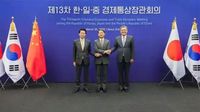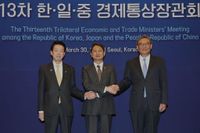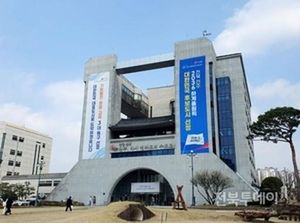In a significant diplomatic move, China, Japan, and South Korea have agreed to collaborate on trade issues, particularly in response to impending tariffs imposed by the United States. This announcement, made on March 30, 2025, marks the first economic discussions among the three nations in five years, signaling a renewed commitment to regional trade cooperation.
The trilateral meeting, which took place in South Korea, involved the Ministers of Commerce from the three countries and was reported by Yuyuan Tantian, a social media channel affiliated with the Chinese government. The discussions aimed to facilitate trade and strengthen supply chains amid rising tensions due to U.S. trade policies under President Donald Trump.
According to Ahn Duk-Geun, South Korea's Minister of Trade, the ministers agreed to engage in "close cooperation for comprehensive and high-level discussions" regarding a trilateral free trade agreement (FTA) between South Korea, China, and Japan. This FTA is expected to enhance regional and global trade, especially in the face of potential tariffs that could disrupt existing supply chains.
The meeting comes just days before President Trump is set to announce additional tariffs, which he has dubbed "Liberation Day," potentially altering the dynamics of international trade partnerships. The timing of the trilateral discussions suggests that the three nations are keen to prepare for the economic repercussions of these tariffs.
During the negotiations, the ministers expressed a mutual interest in addressing supply chain vulnerabilities. Japan and South Korea are particularly looking to import semiconductor raw materials from China, while China has shown interest in acquiring chip products from both Japan and South Korea. This exchange could bolster the technological capabilities of all three nations, which are recognized as major exporters in the Asian market.
The trilateral cooperation is not merely about immediate trade responses; it also reflects a broader strategic intent to establish a more resilient supply chain framework. The ministers emphasized the importance of enhancing cooperation within the Regional Comprehensive Economic Partnership (RCEP), which aims to create a more flexible and integrated economic environment in the region.
Despite historical tensions and unresolved conflicts among the three nations, their recent collaboration highlights a pragmatic approach to economic interdependence. The FTA discussions, which have been ongoing since 2012, have faced numerous challenges, yet the current geopolitical climate may provide a renewed impetus for progress.
Future meetings are planned, with the next ministerial gathering set to take place in Japan. This continued dialogue is crucial as the three countries navigate not only the immediate challenges posed by U.S. tariffs but also the long-term implications for their economic relationships.
In summary, the recent trilateral meeting between China, Japan, and South Korea represents a pivotal moment in regional trade relations. By coming together to address supply chain issues and collaborate on a free trade agreement, these nations are taking proactive steps to mitigate the potential fallout from U.S. trade policies and enhance their economic resilience.





